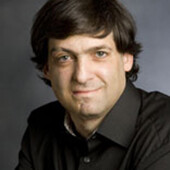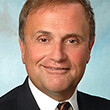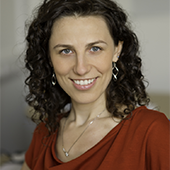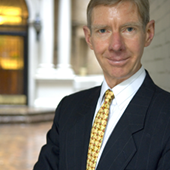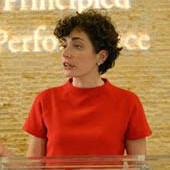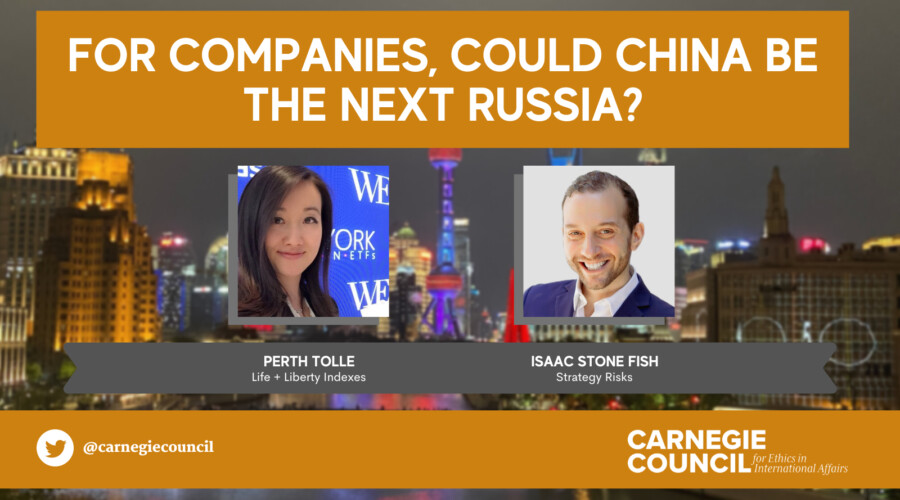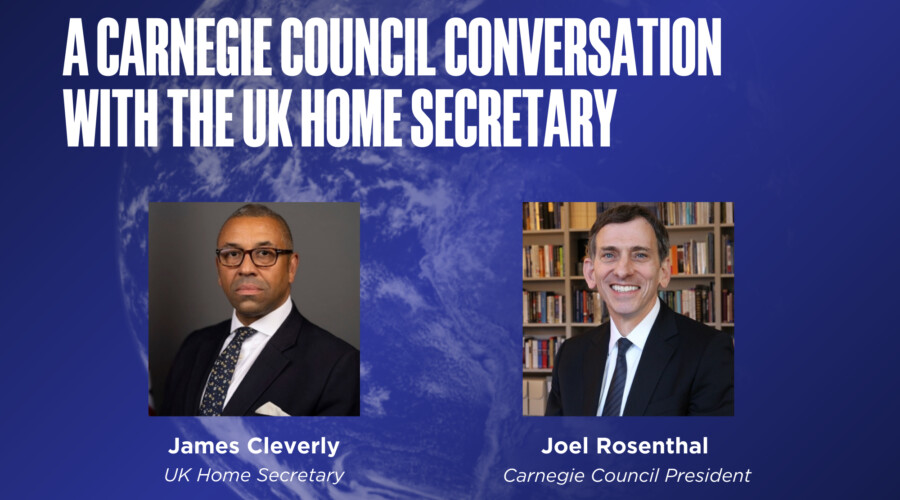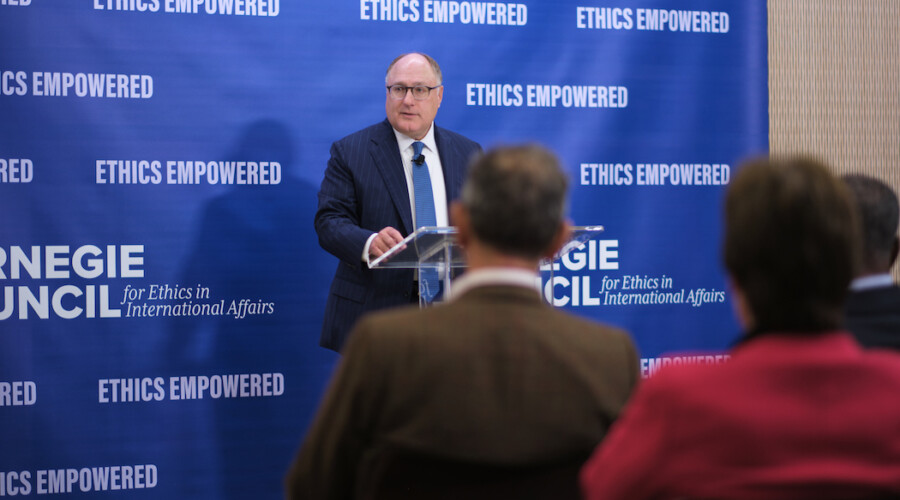In this last installment of our three-part series on workplace ethics in collaboration with EthicalSystems.org, we take an honest look at cheating. According to experts Dan Ariely and Francesca Gino, we all do it. But why? And, more importantly, what can make us stop?
JULIA TAYLOR KENNEDY: You're listening to Impact from the Carnegie Council. I'm Julia Taylor Kennedy.
Each episode, we explore a topic in global business ethics. This time it's cheating.
This is the third and final part in our series produced in collaboration with EthicalSystems.org. It's a free online site connecting corporate leaders with the latest academic research on ethical workplaces. And it's got a great resource page on the kind of petty cheating and lying that can really add up to huge costs for corporations—both on company resources and, if they're discovered, in legal fees.
But before we get into how lying and cheating occur at work, let's hear the story of a liar from the CNBC documentary (Dis)Honesty: The Truth about Lies.
TIM DONAGHY: My name is Tim Donaghy. I grew up in Havertown, Pennsylvania. My father was a college basketball official and because of that, because of my love of sports, I followed in his footsteps and pursued a career as an NBA [National Basketball Association] basketball referee.
JULIA TAYLOR KENNEDY: Tim Donaghy was an NBA referee from 1994 to 2007.
TIM DONAGHY: The NBA is a much different game, if you will, from high school and college. Even though a lot of the rules are written the same, they're not enforced the same. I started to referee based on the rules and how they're written in the rulebook. Unfortunately, I saw some people that were moving up a little bit quicker than me. I learned from the veterans that there's a certain craft and a certain way that you have to do things in order to advance and you know, they'll tell you—certain players are given the benefit of maybe traveling with the basketball rather than other players. Certain players are getting the benefit of not having that critical foul called on them that would send them to the bench.
It's probably about 50/50 when you look at calls that are enforced by the rulebook and then calls that are made or not made based on star treatment, pressure from coaches at certain times.
I've never had conversations with the commissioner about what to call in a game or what not to call in a game, but from the operations department they clearly dictate through video, through emails, through meetings, what they want called and what they don't want called and it always seems to revolve around the star players or the big market teams.
Kobe Bryant is a star in this league. He puts a lot of people in the stands, he sells a lot of sneakers and he sells a lot of jerseys. And the fans paid an enormous amount of money to sit in those courtside seats and they want those types of players on the floor. That's who they came to see. Bottom line is it's more of a form of entertainment than an actual athletic competition.
I don't think the officials feel they are doing something that's not right because in their minds, they're being told what to do from the league office and if they're going to continue to advance and get those big playoff bonus checks, you're going to do what the league wants.
JULIA TAYLOR KENNEDY: Over the years, Donaghy progressed from fudging calls to keep star players on the floor to getting involved in a betting scandal that landed him in jail for 15 months. Pretty alarming tale, especially if you're a basketball fan.
Still, you could argue that professional sports has a unique context and unique temptations—so this story isn't really that instructive. But actually, according to the experts, Donaghy's slide into cheating is pretty common.
DAN ARIELY: Dishonesty is not people saying, "What can I steal and get away with?" It's about what people can rationalize.
My name is Dan Ariely. I'm the James B. Duke Professor of Psychology and Behavioral Economics at Duke University.
JULIA TAYLOR KENNEDY: Ariely was an executive producer of the documentary featuring referee Tim Donaghy.
DAN ARIELY: We've interviewed lots of big cheaters. I'll tell you that almost nobody took the first step toward dishonesty for self-benefit. All of them did it for some other purpose. They were helping a friend. They were doing something just for this quarter. And of course when one step took place, it was easy for them rationalize the next step and the next step, and then things deteriorated from that.
JULIA TAYLOR KENNEDY: In Ariely's work, Donaghy's NBA betting scandal is less relevant than the harder-to-track calls he made about star players' fouls. It's that small-time cheating—the kind, when we're honest, that almost everybody's engaged in—that interests Ariely most. He builds all kinds of experiments to understand when, how, and why we cheat. One of my favorites involves a vending machine that he bought to test how people behave.
DAN ARIELY: One day, I fix the vending machine such that the price on the outside said 75 cents, but the price on the inside was set to be zero. So whenever you put money in and press which candy you wanted, the machine took all the money you gave and gave it to you back, together with the candy.
JULIA TAYLOR KENNEDY: People assumed the machine was broken.
DAN ARIELY: I had a big sign on the side that said, "If the machine is not working well, please call this number."
Here are a few questions you can think about. Question number one is: How many people called the number?
JULIA TAYLOR KENNEDY: Nobody called the number.
DAN ARIELY: Another question is: How many candies did people take? People wanted one, but how many did they take once they realized that this was for free? Well, the answer is that the majority took either four or five. Nobody took six.
JULIA TAYLOR KENNEDY: And here's where it gets really interesting.
DAN ARIELY: Everybody cheated but just a little bit. Nobody went all the way. I think, in their minds, people were kind of trying to make sense of this in the sense of a vending karma. They probably remembered something that happened to them with a different vending machine and they said something like, "You know, I remember that machine. It took my money. It didn't give me candy. That other machine is probably a close relative of this one. I'm just kind of settling the score in some way."
JULIA TAYLOR KENNEDY: People usually walked away after getting five treats from the vending machine.
But they didn't really stop there.
DAN ARIELY: Then on top of that, people called their friends to partake as well. This, again, is an interesting aspect because it means they wanted some social proof that this is actually something that is okay to do.
It's really about this idea of "What can I do and still feel good about it at the moment?— still rationalize it and think of myself as a good person, while at the same time behaving unethically."
JULIA TAYLOR KENNEDY: This rationalization only intensifies in groups.
FRANCESCA GINO: What we wanted to do is to show that people's behavior can be contagious.
My name is Francesca Gino. I am a professor at Harvard Business School.
JULIA TAYLOR KENNEDY: Gino collaborated with Ariely on a set of experiments that looked at cheating in groups.
FRANCESCA GINO: People were invited to a big room and they were asked to work on a series of math puzzles under time pressure. We gave them four minutes to work on 20 different math puzzles. They knew if they solved more puzzles correctly, they would get a better payoff in the study.
JULIA TAYLOR KENNEDY: Gino and Ariely conducted four variations of this same experiment to see how people would behave under different conditions.
FRANCESCA GINO: People came in for four minutes. They worked on the puzzles. Then the experimenter checked their work and then paid them for the number of correct puzzles that they identified.
JULIA TAYLOR KENNEDY: Then they did what they call the "shredder condition." They call it that because it involved a paper shredder.
FRANCESCA GINO: We followed the same procedure but we did an important change. Rather than having the experimenter correct the work, people looked over their own puzzles and solutions. They self-reported their performance. They also paid themselves based on their self-reported performance. After doing so, they were actually asked to shred their test, so there was no evidence of how they actually did.
JULIA TAYLOR KENNEDY: And . . . you guessed it. People were more likely to cheat if no one ever saw the evidence of how they did. Now, in the third and fourth conditions, peer pressure started coming into play.
DAN ARIELY: We asked an actor to sit in the experiment and cheat in an egregious way. What we found was that people who saw the behavior of the actor basically started cheating more.
JULIA TAYLOR KENNEDY: No surprise there.
DAN ARIELY: What was really interesting is that it was not as if people said, "Oh, you know, in this experiment, you can't get caught cheating." It was because people started thinking that people like them cheat.
FRANCESCA GINO: In the two conditions where we had the actor, we varied something minimal, which was the type of sweatshirt that the actor was wearing. This is a study that we conducted at Carnegie Mellon University. So everybody in the room was a Carnegie Mellon student. In one condition, the actor also was wearing a Carnegie Mellon sweatshirt.
DAN ARIELY: People got this extra permission to think that it's okay to cheat. So there is a very strong negative cycle in which one person starts cheating and other people started cheating more and more and more.
JULIA TAYLOR KENNEDY: But then . . . they had the actor change his sweatshirt.
FRANCESCA GINO: In another condition, he was wearing a sweatshirt from the University of Pittsburgh. If you live there and if you know about this university, this is the rival. They don't like each other because of sports issues.
DAN ARIELY: When the acting student was clearly not part of the social group, cheating did not go up at all. In fact, it went down.
FRANCESCA GINO: When the person instead was the person wearing the sweatshirt from the University of Pittsburgh at that point that is a person you dislike. You don't want to be associated with [this person] and there is the condition where you end up being honest.
JULIA TAYLOR KENNEDY: And this is what Gino found most interesting: There are unlikely ways to nudge people in that more honest direction.
FRANCESCA GINO: You generate the sense that you want to distance yourself from the bad apple because you're not like them and you engage in ethical and honest behavior rather than unethical and dishonest behavior.
JULIA TAYLOR KENNEDY: Gino is working with companies to design interventions that apply some of the insights of her academic work.
FRANCESCA GINO: I work with a lot of organizations these days that are running into issues of ethics. When you look at the language that the organization uses, it's all about performance. It's all about meeting targets and so often, there is nothing related to ethics. Even just bringing that into people's conversations inside of organizations can help raise the saliency that ethics is important.
JULIA TAYLOR KENNEDY: That can be done in a lot of ways. One company that wasn't a client of Gino's took an approach that she really admires.
FRANCESCA GINO: Best Buy created an internal website. The entire idea behind having this page was for people to discuss situations in which they either felt they were about to cross ethical boundaries or they actually crossed ethical boundaries. It was anonymous, but it became part of the conversation. How people were actually willing to talk about their moral failures so that others could learn from them.
The number of calls that the ethics office, in a sense, received increased. It seemed like people were willing to report potentially problematic behavior and talk about them.
JULIA TAYLOR KENNEDY: Another intervention that Gino suggests is to bring up honesty and morality early and often. Together with Dan Ariely and other scholars, Gino worked with an insurance company to try and make their customers more honest about the number of miles they drove the prior year. People tend to underestimate the number of miles they drive to keep their insurance costs down, and the company wanted to get a more accurate estimate from their customers.
FRANCESCA GINO: So usually you receive these forms. You read the instructions. You report the number of miles that you drove the prior year. Then you sign at the bottom next to the declaration that numbers are correct.
JULIA TAYLOR KENNEDY: But the research team figured that signing at the end of the form is too late.
FRANCESCA GINO: People have already reported a number. It's not that they're going to go back and change them. For half of the forms, we moved the location of the signature to the top of the form such that now you first sign. Then you report the number of miles that you drove the prior year.
So we ran that study on over 20,000 policies and we found a difference of about 2,500 miles per car suggesting that when people sign first, then they're being more honest.
Signing is a very powerful act. It makes us more aware of what we're doing. It also makes us more aware of what we care about.
JULIA TAYLOR KENNEDY: Gino, of course, is aware that there often isn't a form to reminding people to be honest. Instead, the constant reminders at work are usually to produce and hit performance targets tied to bottom-line results or to volume of work.
FRANCESCA GINO: If this is what we have in mind on a daily basis, it's difficult to resist the temptation of doing something bad that, in fact, has financial benefits in the short term. When, in fact, all the benefits from an ethical standpoint would come up in the long-term.
JULIA TAYLOR KENNEDY: We often hear about the toll of short-term thinking on workplace morality, client relations, even business strategy. But what if an industry were forced to think more long term? Forced to change its systems and processes to discourage shortcuts?
That's exactly what happened to law firms just a few years ago.
BRUCE MACEWEN: September 2008 was really a watershed moment for the industry.
Bruce MacEwen, president, Adam Smith, Esq.
JULIA TAYLOR KENNEDY: Adam Smith, Esq. is a management consulting company that advises law firms. And since the financial crisis, many law firms have needed serious help. Before the crisis hit, they were coming off of decades of growth—and weren't really ready when the winds shifted.
BRUCE MACEWEN: If you look at big law, as I call it somewhat facetiously—but everybody knows what you mean—it was really on a tear from, give or take, 1980 to September 15, 2008. By "on a tear" I mean they could raise rates 6 or 7 percent a year; clients would pretty much pay them. The industry kept growing in terms of headcount, end-profitability.
What the corporate world was doing, U.S. corporations, multinationals, they were right-sizing, Six Sigma-ing, all of that. Law firms were just sailing on in their own ecosystem untouched by any of that management discipline. A friend of mine said, "It is kind of the like the Galapagos Islands before Darwin landed." They had their own whole ecosystem.
JULIA TAYLOR KENNEDY: But with the financial pressure of the economic crisis in 2008, corporate clients were eager to cut any costs they could to salvage profitability. And they started scrutinizing their legal fees. Suddenly, Darwin arrived in the legal world.
BRUCE MACEWEN: Clients discovered they had bargaining power if the value of the time I put in on a matter is $1,000—what the industry is actually collecting is about $830. That is new. Collections used to be near 100 percent. Clients are also refusing to pay for junior associates at any price saying they just don't have value to me.
JULIA TAYLOR KENNEDY: So collections are down, in-house lawyers are up, and junior associate jobs for recent law school grads are few and far between. But maybe the most significant trend in the legal market is a move away from the traditional business model big firms have relied on for decades: the billable hour.
Let me take a minute here to explain how this works. It's actually shockingly simple. A law firm's client receives a bill each year that includes all of the time the law firm's lawyers have spent on the client's cases. So the client will pay, say, $400 dollars per hour any junior associate has spent on their case, plus the far higher rate for a partner's time. It has been a very profitable model for firms, because junior associates are salaried employees—so after they bill enough to cover their salary and benefits, the firm reaps the remainder of their billable hours in profit.
At many firms, associates have traditionally been expected to bill somewhere around 2,000 hours a year, which translates to more than 38 billable hours a week. If you add in their weekly time for pro bono work, administrative tasks, bathroom breaks, lunch, vacation . . . it gets really hard for associates to hit that target of 2,000 billable hours, let alone stand out in a performance review by exceeding it. Extreme stories come out every year about lawyers who have billed an impossible number of hours, or who have padded their income by asking associates to do superfluous tasks or research—and then bill that time to clients.
BRUCE MACEWAN: The firm has an incentive, frankly, to be inefficient. That's never the client's incentive to have a provider be inefficient.
My experience is that's very rare, that there is conscious padding. I am afraid to say that I think there is a real unconscious, unintended tendency to just ever so slightly mis-remember how much time something took. You are just going to tend to adjust the bill in your favor. That can be a lot of money.
JULIA TAYLOR KENNEDY: These incentives to inflate may shift as law firms shift their business models.
VINCENT A. CINO: Vincent A. Cino, chairman of Jackson Lewis.
In September of 2012 when I was elected the chairman, I addressed the partnership and I said, "Look, my fondest desire is to eliminate the billable hour from our vocabulary in this firm."
JULIA TAYLOR KENNEDY: Jackson Lewis is a U.S. labor and employment firm with 55 offices and about 800 lawyers. In 2006, the firm started trying out something called "alternative fee arrangements."
VINCENT A. CINO: Clients were yearning for that degree of course certainty that they have not had before. That got us thinking that there was a way to do this in terms of alternative fee arrangements, whether it's a flat fee for the year for all their work.
We handle the labor issues, employment litigation issues, immigration, benefits. Whatever they wanted us to handle, we would put that into the bucket and then come up with a flat fee for the year that they would pay monthly. They would never have to pay more than that.
To us, this was pretty revolutionary. But we thought it was the beginning of something, I'll say, magical, in terms of developing true and long-lasting client relationships.
JULIA TAYLOR KENNEDY: Then the economic crisis hit, upping the allure of those magical alternative fee arrangements.
VINCENT A. CINO: We got repeated calls from good clients that they were having financial difficulties. "Could we discount some invoices? Could we help them through this period of time?"
JULIA TAYLOR KENNEDY: And the pressure from clients hasn't let up.
VINCENT A. CINO: It's totally a buyer's market. The competition in the legal profession is intense, probably more intense than I've ever seen in 35 years. The firms that can adapt and are nimble and accommodating will thrive. The others who say, "I'm not going to lower my rate," "I'm not going to go into any flat fees"—I think they will face an uncertain future.
JULIA TAYLOR KENNEDY: To beat the competition, the attorneys at Cino's firm are getting far more efficient with the time they spend on clients, especially since their incentives are realigned through these fixed fees. The firm might assign fewer staff to a case, for example.
VINCENT A. CINO: There were ways to do things years ago. You could staff a case with a partner, an attorney, an associate, and a paralegal. Depending upon the case, now, you might just have the associate handle it.
JULIA TAYLOR KENNEDY: They're clearer about strategy early in the process, so they can put in the appropriate amount of resources.
VINCENT A. CINO: At the outset, you want to decide what the client's needs are. Do they want this case settled? Do they want this case tried?
JULIA TAYLOR KENNEDY: After all, a trial takes far more resources than a settlement—so it's important to know if the client is agreeable to a settlement up front. By offering both reduced rates and flat alternative fees, Jackson Lewis beat the odds.
VINCENT A. CINO: We did well during the 2008/2009 years. We increased our market share. We entered into more alternative fee arrangements. That's what gave us such an ability to grow our firm by adding approximately 500 lawyers since 2006 and another 35 offices without incurring a single dollar of debt.
JULIA TAYLOR KENNEDY: What does this have to do with the behavioral work Ariely and Gino were talking about earlier?
Well, it's that rare case where market imperatives actually line up with ethical behavior. Because of client scrutiny and fear of losing clients to competitors or in-house counsel, law firms like Jackson Lewis are having to cut back on the behavior that's been the norm for years: rounding up, overstaffing, or taking an ambitious courtroom strategy that can lead to overbilling clients. Cino admits these behaviors are pretty hard to avoid in the billable hours model.
VINCENT A. CINO: In the end, it's an ethical issue. You have to bill the proper time for the work you're doing. Was there creepage? I'm sure there was.
JULIA TAYLOR KENNEDY: The creepage doesn't matter so much with flat fee arrangements. But Cino's well aware that his firm may take a loss in some years with some clients, if cases or other legal matters become more time-consuming than expected.
VINCENT A. CINO: We found out that clients love the idea of us taking on some risk. They love the idea that we're in it for the long haul.
JULIA TAYLOR KENNEDY: Other clients have stuck with the traditional billable hours. Much to Cino's regret.
VINCENT A. CINO: Every month we send out between 12,000 and 14,000 bills. Many clients want to see the hours. There's some comfort there to some clients.
JULIA TAYLOR KENNEDY: And then, of course, there's also the challenge of changing habits among the lawyers themselves.
VINCENT A. CINO: I've always believed that lawyers are the most change-resistant people on earth. I think that's still true. Several years ago, we had a productivity bonus. That is, if an associate billed 2,000 hours, they would get a bonus of X dollars. If they billed 2,100 hours, they would get a bigger bonus; 2,200, a bigger bonus.
Then we looked at what was going on in the world and what our clients were thinking. We said, "We're not going to have a productivity bonus."
JULIA TAYLOR KENNEDY: After all, the incentive to earn a "productivity bonus" was to log as many billable hours as possible; something that's no longer profitable to Jackson Lewis.
VINCENT A. CINO: When I tell prospective clients in a meeting we don't have a productivity bonus, the reaction is fabulous because they immediately understand they're not going to pay for somebody to get to that 2,200 hour mark for the sole purpose of getting a larger bonus.
JULIA TAYLOR KENNEDY: Some of the lawyers, though, weren't so pleased.
VINCENT A. CINO: To be frank, associates who are coming out of law school and they have huge debt—some thought that wasn't great for them. So there was a bigger picture here that we had to look at.
JULIA TAYLOR KENNEDY: Cino is now moving away from billable hours entirely as a metric for performance. He's told his associates that this year, their hours have nothing to do with their end-of-year bonuses or their ratings.
VINCENT A. CINO: Instead, we are going to look at responsiveness, high quality of work, pro-bono commitment, a team approach to cases.
Some people can work and do maybe less hours but the client is just thrilled with their work. That's the person we want to reward. That's the person we want to retain. That, I think, is the way it's going to shape up at the end of the year. I think it's going to be fantastic.
JULIA TAYLOR KENNEDY: So, it looks like the market has forced the legal profession to give better value to their clients, to cut back on some of the rounding up, the cheating here and there to maximize profits. And this suggests that context can create honesty or dishonesty.
Both MacEwan and Cino insist they never encountered a lawyer who purposely inflated their hours. But they also admit most lawyers probably do it unconsciously. So now that a high volume of billable hours isn't delivering profits or bonuses at Jackson Lewis, more honest behavior is likely a side effect of the firm's new business model.
And at the end of 2015, Cino plans to test whether it worked or not.
Honesty as side effect is a familiar phenomenon to Harvard Business School professor Francesca Gino.
FRANCESCA GINO: I can think of research that I've conducted to try to reduce turnover in organizations or tried to increase employee engagement. Those are projects in which ethics wasn't the primary focus, but by engaging in those projects and being able to increase employee engagement and reduce turnover and increase performance, I was also able to reduce unethical behavior.
I think there are interesting ways to address ethics by not tackling it directly, but tackling it indirectly.
JULIA TAYLOR KENNEDY: For companies uncomfortable with confronting ethics head-on, maybe this sideways approach can work well. But what can get lost there is an ability to truly eradicate the "grey area" that surrounds so many of our decisions at work. That lack of clarity can allow us to rationalize rounding up our hours or billing the company for a social lunch with a friend.
DAN ARIELY: I think organizations need to worry about that grey zone. They need to limit it. Grey zones are nice because people can make their own decisions every time but also dangerous because people can make the wrong decisions every time. Imagine that there was kind of a timeline before cheating occurs, during the time when something is tempting, and after the fact.
The standard economic framework saying, just worry about after the fact, create high penalties or high probability of being caught, and that will solve everything—we don't have any empirical evidence for that. Instead, we think that we need to think about things upfront.
How do you take the moment where people are most tempted to behave badly and try to eliminate temptation in those moments? I think if we think about it in those ways, we will do much better.
JULIA TAYLOR KENNEDY: It seems simple: just eliminate that temptation to cheat. And yet, impacting that moment in time for thousands of employees takes enormous change. It requires entire systems of compensation, company processes, business models, and government regulation that prevent temptation, not to mention deep knowledge of human psychology to understand when and how that temptation occurs—and what will override it.
Thanks for listening to Impact from the Carnegie Council. As I mentioned earlier, this podcast was produced in collaboration with EthicalSystems.org where you can learn more about topics in behavioral ethics from top academics in the field.
A special thanks to our production team, Mel Sebastiani, Terence Hurley, Amber Kiwan, Deborah Carroll, Alex Woodson, and Chris Green. And thanks to the team at EthicalSystems.org—especially to Jonathan Haidt, Jeremy Willinger, Katharina Weghmann, and the late Bryan Turner. Thanks also to Yael Melamede and Dan Ariely for permission to use audio from the CNBC documentary (Dis)Honesty: The Truth About Lies. I'm Julia Taylor Kennedy.
You can find out more about this podcast at carnegiecouncil.org. You can also find us on www.policyinnovations.org, on iTunes, or wherever you download your podcasts.
